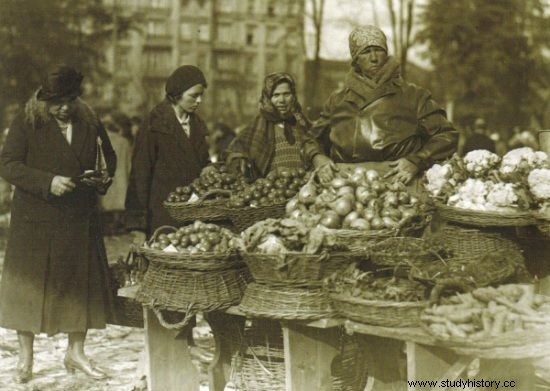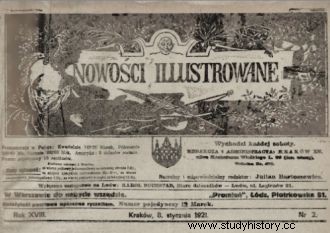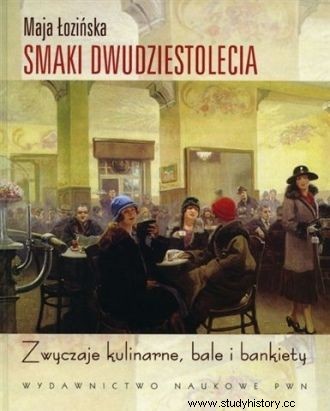First, there was a frenzy of joy from regaining an independent homeland. Whoever was in a hurry to celebrate, but apart from a good mood and patriotic feelings, ordinary people had little more. Then came the Polish-Bolshevik war. Pale fear fell on the people of Warsaw, and the Bolsheviks stripped large areas of the country of food. It was poor, it was hungry. But a Pole can.
Shortly after Poland regained independence, simply supplying the household with even the simplest products was a real challenge. The country started almost from scratch and in addition had to unite three completely different parts of its territory. In each of them, they paid in a different currency, used different units of measurement and weights, and followed different culinary customs. Moreover, there was no such thing as a Polish economy. It was a conglomeration of three post-abortion remains, mostly unconnected by trade ties and devastated as a result of subsequent armed conflicts.
Immediately after the First World War, food was scarce everywhere and almost everyone (except the richest) suffered from a shortage. In this crisis period, it was in vain to look for a well-stocked stall or a shambles. Even the inhabitants of Greater Poland, i.e. the former Prussian granary, exercised quite a bit to provide themselves with fairly normal food. Leonard Turkowski recalled:
How often the soup was cooked on a sauerkraut, that is, on water from cooking guts and cold meats, for which you had to stand in a long line in front of the butcher in front of the butcher - sometimes two or three hours until cooking is finished. We waited even longer for bread at the baker, queuing in the middle of the night (Quote after:Maja Łozińska, "Tastes of the twenty-year period").

There were bargains in Poland and during the war and after the war ... only strip prices often made it difficult to buy anything (an example illustration from Maja Łozińska's "Tastes of the 20th century".
Well, man does not live by soups and bread alone! People from Poznań went to the countryside to buy potatoes - aka Wielkopolskie pyry. By the way, they could arrange a coffee substitute. They picked ripe ears of cereals from the fields, then peeled their contents at home, got rid of the chaff with a sieve and burned in a frying pan. Then it was enough to grind the "coffee" prepared in this way and you could enjoy the aroma with a slight hint of charred.

The "Illustrated News" lamented the cold and hungry Christmas Eve of 1920. The lack of carp and other traditional dishes had to be made up for with a family atmosphere.
Anyway, 1920 was exceptionally thin for Poles. The Commonwealth had to make a healthy effort to expel the Bolsheviks from its borders, and the Battle of Warsaw decided the matter, but did not settle it. It is therefore not surprising that when it came to harvest, and in the fall to excavation work, the crops were not stunning. All this had to translate into food prices, which Poles felt especially during Christmas, which they used to celebrate lavishly and abundantly. Even exceptionally resourceful housewives had little reason to light a stove (or fuel). There was no roasting of strudels, no cooking of mushrooms, no making Christmas Eve ears.
A month before Christmas, the Krakow magistrate urged the city's citizens to try to get fish themselves, catching or bringing them. Apparently, the officials sensed the matter with their noses, because speculators just before Christmas soared prices that many Cracovians had to eat away with the taste, because he could not afford a Christmas Eve carp. Ba! Even the herring gave up and when brought into town too early, they simply stinked. A journalist from "Nowości Ilustrowane" complained:

The article is based mainly on the book by Maja Łozińska "Tastes of the twenty-year period" (PWN 2012).
At the family council held a week ago, the question was seriously considered, it turned out that all possible and impossible credits that could be allocated for this purpose, it is not sufficient. [...] So I ended up breaking with the remnants of last year's wafer and exchanging wishes for a better year to come. Tea with saccharin and a piece of bread without butter completed the family feast, after which you had a very restful sleep.
Fortunately, the Second Republic of Poland recovered from the crisis, led by the hand of Prime Minister Grabski. His reforms improved the economic situation, so that housewives no longer had to worry about what to put in a pot, and the potato peel dinner was a thing of the past. At least for a while - because in 1929 Wall Street with a bang shattered the entire world economy, plunging Poland into collapse as well. Our grandparents were at least hardened for such a circumstance…
